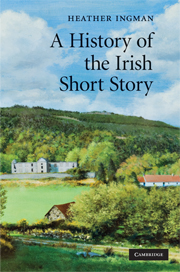Book contents
- Frontmatter
- Contents
- Acknowledgments
- 1 Introduction
- 2 The nineteenth century: nation and short story in the making
- 3 Fin de siècle visions: Irish short fiction at the turn of the century
- 4 The modern Irish short story: Moore and Joyce
- 5 1920–1939: years of transition
- 6 1940–1959: isolation
- 7 1960–1979: time, memory and imagination
- 8 1980 to the present: changing identities
- Notes
- Biographic glossary
- Bibliographic essay
- Index
8 - 1980 to the present: changing identities
Readings: John McGahern and Éilís Ní Dhuibhne
Published online by Cambridge University Press: 04 August 2010
- Frontmatter
- Contents
- Acknowledgments
- 1 Introduction
- 2 The nineteenth century: nation and short story in the making
- 3 Fin de siècle visions: Irish short fiction at the turn of the century
- 4 The modern Irish short story: Moore and Joyce
- 5 1920–1939: years of transition
- 6 1940–1959: isolation
- 7 1960–1979: time, memory and imagination
- 8 1980 to the present: changing identities
- Notes
- Biographic glossary
- Bibliographic essay
- Index
Summary
Writing in The Irish Times in 1990, Fintan O'Toole was somewhat dismissive of the short story form: ‘short stories, if they are written at all, are there to keep things ticking over in the spaces between novels’, and he commented on ‘the marginalisation of the Irish short story since the days of O'Connor, O'Flaherty and O'Faolain’. Such a view, understandable in the context of O'Toole's argument about recent developments in the Irish novel, ignored the fact that the closing decades of the twentieth century saw an upsurge in short story writing in Ireland with a variety of outlets and opportunities for new authors to get their work published or aired on the radio.
Short stories are not generally regarded as profitable by publishers but their length makes them suitable for newspapers, magazines and radio, and more satisfactory for the reader or listener than extracts from novels. In 1988, the Sunday Tribune took over David Marcus' New Irish Writing Page and under Ciaran Carty's editorship it continued to support emerging Irish writers. Writers who were published in its pages became eligible for a Hennessy Award and anthologies arising out of this, The Hennessy Book of Irish Fiction (1995) and The New Hennessy Book of Irish Fiction (2005), edited by Ciaran Carty and Dermot Bolger, featured high quality writing by Joseph O'Connor, Hugo Hamilton, Colum McCann, Neil Jordan, Philip Ó Ceallaigh, Anne Enright, Deirdre Madden, Angela Bourke and Claire Keegan, among others.
- Type
- Chapter
- Information
- A History of the Irish Short Story , pp. 225 - 266Publisher: Cambridge University PressPrint publication year: 2009



